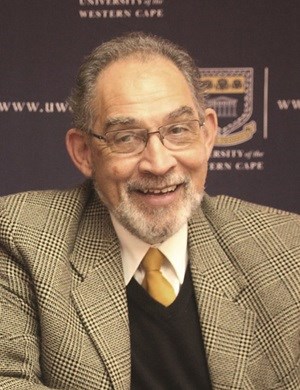
The accolade is awarded to individuals considered to have made extraordinary contributions, of international standard and impact to the development of science in and for South Africa over an extended period of time. An additional consideration is the manner in which their work has touched and shaped the lives and views of South Africans.
O’Connell has committed his life to delivering quality education which impacts on those he has come into contact with and also to the development of South Africa. Through this quest, he has been a role model for educators and communities and has initiated and inspired institutional change. He has been described by his colleagues as being “driven by a passionate commitment to the development of South Africa and a deep desire to make a contribution to that development”.
As someone born and raised in District Six, O’Connell had intimate knowledge of the struggles experienced by most South Africans under apartheid. From the very beginning of his career as an educator, he committed himself to the upliftment of the country’s profoundly disadvantaged citizens and restoration of their dignity. This role did not end with the coming of democracy, but gained a new urgency.
O’Connell graduated with a Bachelor of Arts and qualified as a teacher at the University College of the Western Cape (now UWC). While teaching, he obtained his BA Honours degree cum laude as a part-time student of the University of South Africa. Then, on the strength of his achievements, he won a Fulbright Scholarship to Columbia University, New York, where he took MA and MEd degrees. Between 1970 and 1985 he worked as a teacher, vice-principal and principal at various schools in Cape Town, before taking up the position of senior lecturer in education at UWC. Four senior positions followed: acting vice-rector of the Peninsula Technikon; rector of the Athlone College of Education; head of the Provincial Department of Education (responsible for all schools in the Western Cape); and, in 2001, rector and vice-chancellor of UWC. He retired from that position in 2014.
From the start of his time as UWC rector, O’Connell was committed in distinctive ways to the vision, first fully articulated by Jakes Gerwel, of transforming the university from an apartheid-era “bush college” to a leading autonomous knowledge institution with a strong, research-rich environment. This was no easy task.
The transition to democracy in South Africa was a euphoric time, but it had bled the university of many of its leading figures to serve in government. This included its dynamic rector, Jakes Gerwel. The changing climate and leadership slippage in the ensuing years brought the university to the point of bankruptcy and a crisis of public confidence. It was at that point that O’Connell was appointed rector. He skillfully convinced sceptics that the institution was a going concern and guided UWC out of a R140m deficit. His tireless activism and determination and a remarkable ability to build internal confidence and mobilise resources were instrumental in attracting excellent academics, building strong international partnerships, and gaining very substantial financial support. As a result, UWC is now in the top group of research-intensive universities in South Africa, and, on a recent rating by the Times Higher Education Supplement, it ranked in the top 3% of universities worldwide.
O’Connell’s passionate conviction, intellectual clarity and engaged leadership in education and development have been recognised by a number of prestigious fellowships and grants through the years, honorary doctorates from the University of Missouri and the University of South Africa, a Belgian Order of Knighthood (Commander of the Order of Leopold II), and the Paul Harris Award of Rotary International.